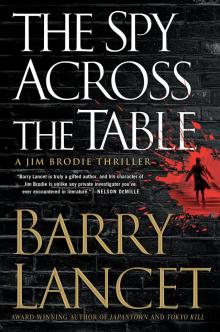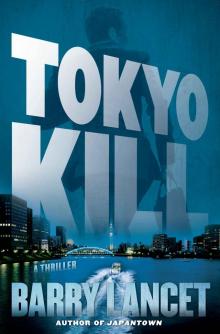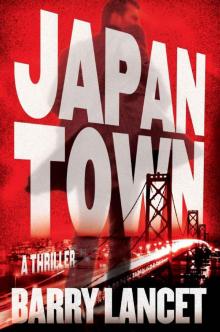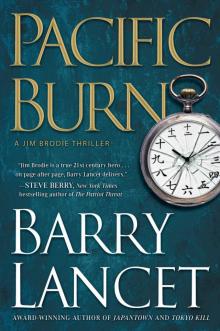- Home
- Barry Lancet
Tokyo Kill
Tokyo Kill Read online
Thank you for downloading this Simon & Schuster eBook.
* * *
Join our mailing list and get updates on new releases, deals, bonus content and other great books from Simon & Schuster.
CLICK HERE TO SIGN UP
or visit us online to sign up at
eBookNews.SimonandSchuster.com
Simon & Schuster
1230 Avenue of the Americas
New York, NY 10020
www.SimonandSchuster.com
This book is a work of fiction.
Any references to historical events, real people, or real places are used fictitiously. Other names, characters, places, and events are products of the author’s imagination, and any resemblance to actual events or places or persons, living or dead, is entirely coincidental.
Copyright © 2014 by Barry Lancet
All rights reserved, including the right to reproduce this book or portions thereof in any form whatsoever.
For information address Simon & Schuster Subsidiary Rights Department, 1230 Avenue of the Americas, New York, NY 10020.
First Simon & Schuster hardcover edition September 2014
SIMON & SCHUSTER and colophon are registered trademarks of Simon & Schuster, Inc.
The Simon & Schuster Speakers Bureau can bring authors to your live event.
For more information or to book an event contact the Simon & Schuster Speakers
Bureau at 1-866-248-3049 or visit our website at www.simonspeakers.com.
Interior design by Kyoko Watanabe
Jacket design by Jae Song
Jacket photographs from Shutterstock
Library of Congress Cataloging-in-Publication Data
Lancet, Barry.
Tokyo kill : a thriller / Barry Lancet.
pages cm
1. Antique dealers—California—San Francisco—Fiction. 2. Private investigators—Japan—Fiction. 3. World War, 1939–1945—Japan—Tokyo—Fiction. 4. Murder—Investigation—Fiction. 5. Chinese—Japan—Fiction. 6. Tokyo (Japan)—Fiction. I. Title.
PS3612.A547486T65 2014
813'.6—dc23 2014001390
ISBN 978-1-4516-9172-6
ISBN 978-1-4516-9174-0 (ebook)
* * *
CONTENTS
Epigraph
Day 1: Triads
Chapter 1
Chapter 2
Chapter 3
Chapter 4
Day 2: The Echo of War
Chapter 5
Chapter 6
Chapter 7
Chapter 8
Chapter 9
Chapter 10
Chapter 11
Chapter 12
Chapter 13
Chapter 14
Chapter 15
Chapter 16
Chapter 17
Chapter 18
Chapter 19
Chapter 20
Chapter 21
Day 3: Handcuffed
Chapter 22
Day 4: Besieged
Chapter 23
Chapter 24
Chapter 25
Chapter 26
Day 5: Pursued
Chapter 27
Chapter 28
Chapter 29
Chapter 30
Chapter 31
Day 6: Black Wind
Chapter 32
Chapter 33
Chapter 34
Chapter 35
Chapter 36
Chapter 37
Chapter 38
Chapter 39
Chapter 40
Chapter 41
Chapter 42
Chapter 43
Chapter 44
Day 7: The End of “Once”
Chapter 45
Chapter 46
Chapter 47
Day 8: The New Devil
Chapter 48
Chapter 49
Chapter 50
Chapter 51
Chapter 52
Chapter 53
Chapter 54
Chapter 55
Day 9: Twice as Hard
Chapter 56
Chapter 57
Chapter 58
Chapter 59
Day 10: Joy Killer
Chapter 60
Chapter 61
Chapter 62
Day 11 & 12: Bandits and Water Elephants
Chapter 63
Chapter 64
Chapter 65
Chapter 66
Chapter 67
Chapter 68
Day 13: Choke Point
Chapter 69
Chapter 70
Chapter 71
Chapter 72
Chapter 73
Chapter 74
Chapter 75
Chapter 76
Chapter 77
Chapter 78
Chapter 79
Chapter 80
Chapter 81
Epilogue
About Authenticity
A Final Note
Acknowledgments
About Barry Lancet
NOTE TO READERS:
The two main systems for writing Chinese words in English are Wade-Giles and Pinyin. Since most of the Chinese-related scenes take place in China, I’ve chosen Pinyin, even though in some instances I prefer Wade-Giles. In the case of Jiang Jieshi, I’ve worked both names into the text since the Western reader perhaps knows him more commonly as Chiang Kai-shek. The same goes for Sun Yixian, whose name often appears as Sun Yat-sen.
The reverse side also has a reverse side.
—JAPANESE PROVERB
DAY 1
TRIADS
CHAPTER 1
TOKYO, 2:36 P.M.
EIGHT people had already died by the time Akira Miura showed up at our door fearing for his life.
When the commotion broke out I’d been on a long-distance call to London trying to track down an original ink painting by Sengai, the renowned Japanese painter-monk of Circle, Triangle, and Square fame. The rumor had come out of the United Kingdom, so I was plying channels to nail down the potential gem for a client in San Francisco who would kill to get it, and kill me if I didn’t.
People killed for a lot less. I learned this anew with each day spent at Brodie Security, the detective agency and personal protection firm established by my father in the Japanese capital more than forty years ago.
Had I been sitting in my antiques shop in San Francisco instead of behind my father’s battered pine desk in Tokyo, I wouldn’t have given the shouting match in the front office a second thought, but in Japan a loud altercation constituted a serious breach of decorum.
If not more.
Mari Kawasaki tapped on my door. “Brodie-san, I think you should get out here.”
All of twenty-three but looking more like sixteen, Mari was the office tech whiz. When I came to town, she lent me a hand. We were a small operation and people wore multiple hats.
“Could I call you back later today?” I asked my London connection. “Something urgent has come up.”
He said certainly and I jotted down his schedule, bid a polite good-bye, and stepped out onto the main floor.
Mari pointed across the room to where three hardened Brodie Security ops had herded a fourth man against a wall. The man cast indignant glares at them, and when my people didn’t wither and fall back, he pelted the trio with the exasperated sighs middle-management salarymen usually fling at underlings.
That didn’t work either.
Mari rolled her eyes. “He charged in here demanding to speak with you and refused to explain himself or wait at reception.”
When the unexpected reared up at Brodie Security, containment came before all else. Our work brought us into contact with every manner of fringe character. Old-timers still talk about the right-wing lunatic who sprang from the elevator with sho
rt sword drawn and put two of the staff in the hospital.
“Calm down,” one of the three men cooed. “If you would just return to the reception area . . .”
The salaryman was irate. “But it’s urgent. My father is a sick man. Can’t you see that?” He saw me and yelled across the expanse in Japanese, “Are you Jim Brodie?”
Since I was the only Caucasian in a sea of Asian faces, it wasn’t a brilliant deduction. Our unannounced guest was handsome in the unassuming way Japanese men can be. He was in his fifties and sheathed in the requisite business suit—dark blue in his case—with a white dress shirt and a perfectly knotted red silk tie. The tie had set him back some. What looked like platinum cuff links sparkled at his wrists. His attire was flawless, and under normal circumstances he’d be considered nonthreatening. But his expression was frayed, as if he were unraveling from the inside.
“That’s me,” I said in his native language.
He drew himself up. His eyes grew watery. “Kindly allow my father to intrude. He is not well.”
All eyes shifted toward the paternal figure waiting patiently at Reception. He had a full crown of silver-gray hair and the same unassuming good looks: sculpted cheekbones, a firm chin, and the deep brown eyes women habitually swoon over.
He waved a wooden walking staff in salute, then began a tremulous foray around the unmanned half-counter that passed for Reception in our no-frills office. With singular determination he shuffled forward. His hands trembled. The cane shook. He wheezed with each step. And yet, there was something noble in the effort.
He had dressed for the trip into town. A brown hand-tailored suit that had gone out of style maybe three decades ago. As he drew closer the smell of mothballs suggested his attire had been plucked from a dusty clothes rack expressly for this visit.
Three feet away, he stopped. He squinted up at me with unflinching brown eyes. “Are you the gaijin the papers said caught the Japantown killers in San Francisco?”
Gaijin means “foreigner,” literally “outside person.”
“Guilty as charged.”
“And tackled the Japanese mafia before that?”
“Guilty again.”
For better or worse, the overseas murders and my run-in with the Tokyo thugs had made headlines in Japan.
“Then you’re my man. Got notches on your belt.”
I smiled and his son, who had sidled up on the other side, whispered in my ear. “That’s his meds talking. Makes him emotional. Sometimes delusional. I only mentioned coming here to calm him. I never thought he’d actually do it.”
His father frowned. He hadn’t heard what was said, but he was astute enough to guess the content. “My son thinks I’ve toppled off the train because I’ve put on a few years. Well, I’m ninety-three, and until last December I could walk three miles a day without a damn stick.”
“A few years? You’re ninety-six, Dad. You shouldn’t be charging around town like this.”
The old man waved the cane under his son’s nose. “You call this charging? There are tombstones in Aoyama Cemetery that move faster than I do, but upstairs my train’s still running on straight tracks. Besides, when a man my age no longer wants to shave off a couple years to impress the ladies, then he’s done for.”
I was going to like this guy.
I said, “Why don’t we step into my office? It’s quiet there. Mari, would you show these gentlemen the way? I’ll be there in a minute.”
“Follow me, please,” she said.
Once Mari had shut them in, I turned to a pale-faced detective nearest the entrance. “Anything else besides their showing up without an appointment?”
“Only the last name. Miura.”
“Okay, thanks. Do you know where Noda is?”
Kunio Noda was our head detective and the main reason I came away from the Japantown case in one piece.
“He’s out on the kidnapping case in Asakusa but supposed to be back shortly.”
“Send him in as soon as he arrives, okay?”
“Will do.”
I headed back to my office, where I exchanged cards and the customary bows with the new arrivals. The father’s name was Akira Miura and he’d once been senior vice president of a major Japanese trading company.
The son with the pricey tie was a fuku bucho, or assistant section chief, at Kobo Electronics. His company was equally impressive but his position was not, especially for a Japanese salaryman in his fifties. You didn’t start making good money until you hit bucho, the next step up for Yoji Miura, so either he was spending beyond his means or there was money trickling in from another source.
Taking my seat I said, “So, gentlemen, how can I help?”
Before they could respond, Mari knocked and entered. On a tray she carried green tea in decorated porcelain cups with lids. Guest chinaware. In Japan, courtesy rules.
“I was in the war, Mr. Brodie,” Akira Miura said after Mari departed.
When a Japanese mentions the war, he or she means World War II. And only the youngest soldiers—now the oldest surviving veterans—were around today. Japan fought no further battles after the big Double Two.
“I see,” I said.
Miura Senior’s eyes zeroed in on me. “How much do you know about Japanese history, Mr. Brodie?”
“Quite a bit, actually.”
My endeavors in the field of Japanese art made knowledge of the country’s history, culture, and traditions mandatory.
“Did you know that in the old Japanese army you followed orders without question, or your commanding officer put a bullet in your head?”
“Yes.”
“Good. Then you probably also know that my country conquered part of Manchuria and set up a puppet state.”
I did, and he seemed pleased.
Japan had entered China aggressively in the early 1900s, then cemented its grasp by laying railroads, bringing in settlers, and setting up branches of its large conglomerates. In 1932 it famously resurrected the rule of China’s twelfth and final Qing Dynasty ruler, Pu Yi, canonized in popular culture as the Last Emperor.
Miura said, “I was sent to the Manchurian front in 1940 as an officer. My men and I fought many battles. Then new orders shifted us to a frontier outpost called Anli-dong. Our assignment was to stabilize the region, and I became the de facto mayor of Anli and the surrounding area.
“We were outnumbered two hundred to one, but by that time the Japanese military had a reputation so fierce we retained control without incident. Although I preached nonviolence and it held, my predecessor had been ruthless. Any Chinese male offender faced a firing squad or worse, and his women became the spoils of war. Which is why I need you.”
“For something that happened more than seventy years ago?”
“You’ve heard about the recent home invasions in Tokyo?”
“Sure. Two families slaughtered within six days of each other. Eight people were killed.”
“You saw the police suspect Triads?”
“Of course.”
“They’re right.”
Inwardly I cringed at the mention of the blade-wielding Chinese gangs. I’d run into them in San Francisco once when I lived out in the Mission. It hadn’t ended well.
“How can you be so sure?”
Miura’s handsome brown eyes flooded with fear. “In Anli-dong they told me they would come after us. Now they have.”
CHAPTER 2
HE had my attention. “How can you be so sure the Triads are targeting you after all this time?”
“Because I know what was not in the papers.”
“Which is?”
“Two of my men are dead all of a sudden.”
My men. “And you told this to the police?”
“Uma no mimi ni nembutsu,” he said with undisguised disdain.
Might as well read sutras to horses. Meaning the Japanese police were too dense to understand.
“But you did tell them?”
He shrugged. “They insisted the killings
couldn’t possibly be motivated by ‘ancient history.’ ”
During the war years, the Japanese police became an organ of terror at home almost as much as the armed forces did abroad. After the surrender, the police were emasculated. A heavy-handed bureaucracy filled the vacuum, and to this day a cautious mind-set colors their every action, which leaves a lot of territory for the likes of Brodie Security.
“And you think otherwise because?”
“My gut.”
His son smiled apologetically.
I ignored Miura the Younger but could no longer dismiss his earlier comments about his father’s instability. “And what is your gut telling you?”
“That two of my men killed so close together is no coincidence.”
I said, “Even assuming that what you say is true, how would Brodie Security be able to help?”
“Guard my house.”
His son wanted me to humor him, so I said, “That we can do. But security takes men, in teams, and doesn’t come cheap. Are you sure?”
“I’m sure.”
I looked at his son, who nodded reluctantly.
“Okay,” I said, “we’ll put some men on you for a few days.”
“I also want you to find out who butchered my friends.”
“The murders landed on the front page. You can bet the police have made them a top priority.”
He shook his head. “The police are idiots. I gave them a connection and they didn’t even bother to check it. Both men served together because they grew up in the same neighborhood. The same place they were killed. It is not a gang of thieves targeting the neighborhood, as the police think, but Anli-dong Triads targeting my men.”
There was a knock, then Noda barreled in without waiting for a reply. The chief detective was short and stout and built like a bulldog—broad shoulders, a thick chest, and a flat humorless face. His most distinctive feature was a slash across his eyebrow where a yakuza blade had left its mark. Noda’s return swipe left a deeper mark.
I made introductions and brought Noda up-to-date. He grunted when I mentioned the Triads.
“What? You think Triads are a possibility?” I said, pushing the habitually laconic detective for a more revealing response.
Chinese gangs had been in Japan for decades. They could trace their roots back to the end of the Ming Dynasty in China, where they started as a political group aiding the government against the invading Manchus, and were hailed as heroes. Over time the glory faded. But the beast needed feeding. Triad leaders looked elsewhere to buttress their dwindling support and found the easy money—protection, extortion, loan sharking, prostitution, and drugs. First at home and, inevitably, overseas. In Tokyo, gangs inhabited the darker corners of Shinjuku, Ueno, and other enclaves. Yokohama Chinatown, thirty minutes by train, was a major operational base.

 The Spy Across the Table
The Spy Across the Table Tokyo Kill
Tokyo Kill Japantown
Japantown Pacific Burn
Pacific Burn